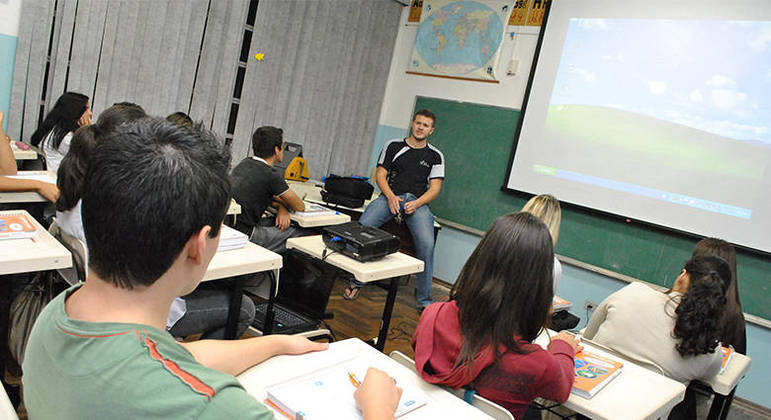[ad_1]
In his Confessions, Augustine of Hippo recounts an anecdote about his beloved teacher Ambrose that has assumed an important place in cultural history. Its renown has little to do with religion, although Ambrose was the bishop of Milan in the late fourth century A.D. and was, like Augustine, canonized as a Catholic saint. (In fact, I only mention this because it would be weird not to.)
When Ambrose sat down with a book, Augustine records, “His eye glided over the pages, and his heart searched out the sense, but his voice and tongue were at rest.” It is the kind of detail about someone you would not notice, let alone record for posterity, unless it seemed anomalous in some respect. And Augustine’s discussion of the matter suggests others regarded Ambrose’s habit of reading in silence as peculiar — enough so that they speculated on why he did it. Augustine’s best guess is that Ambrose was trying to preserve his voice, “which a very little speaking could weaken.” He mentions that Ambrose permitted himself only “the sustenance absolutely necessary” to keep alive. Perhaps vocal fatigue was a side effect of his asceticism.
Beginning in the late 19th century, Augustine’s reminiscence has been taken to imply that reading aloud was the norm in the ancient world, even for an extremely well-educated Roman citizen (in Augustine’s case, a professor of rhetoric, no less). Allowing the phonetic text to resonate in the mind, without any detour through the lips and ears, counted as an especially rare and enigmatic skill. That is quite a bit of historical deduction to hang on a single anecdote, and scholars have challenged it for some while now, brandishing evidence to the contrary. One interpretation of the passage in the Confessions even suggests that what perplexed Augustine et al. was not the ability to read silently but a breach of pedagogical protocol: an educator was expected to share a book by reading aloud. In that case Ambrose wasn’t pioneering some esoteric intellectual practice — just bogarting the text, if you’ll pardon the idiom.
But the advent of silent reading must have been an inflection point in the history of human consciousness, whenever it happened, adding new depths to the experience of interiority. And while the historical significance of Augustine’s remarks about Ambrose may have been misconstrued, his autobiography remains compelling precisely because it is a monumental account of the self’s transformative encounter with language, especially the written word.
A couple of recent books take up this notion of reading as an active, reflexive, open-ended process — one involving something more than the transmission of information. Robert DiYanni’s You Are What You Read: A Practical Guide to Reading Well (Princeton University Press) is the more didactic of the two, while Heather Cass White’s Books Promiscuously Read: Reading as a Way of Life (Farrar, Straus and Giroux) speaks to and for people well along in their bookish ways. Both authors concentrate on literature, primarily fiction and poetry, but make points that apply more generally. They are advocates of deep attention, which comes in different forms and levels of intensity. (DiYanni is an adjunct professor of humanities at New York University and White a professor of English at the University of Alabama.)
DiYanni’s volume offers a course of instruction in “close reading,” to use a piece of English department jargon from decades long past. It entails, as DiYanni puts it, the “careful noticing of a work’s details, including its language and structure … looking for patterns, such as contrast and conflict, repetition and variation.” This is more readily endorsed than acquired as a set of skills. For one thing, close reading involves moving through a text very slowly, at times, and tuning out your own thoughts and impressions long enough to give maximum attention to what the author has said — and how. It is a skill best acquired through seeing it performed, and DiYanni offers scores of examples.
He also stresses the benefits of nonsilent reading:
“The ear hears what the eye overlooks; the ear prompts the eye to see. Reading aloud enables writers and readers to hear how sound shapes sense … Readers must make choices about the tempo and tone of their reading. They must choose a spirit in which to read, one that allows the rhythms of word and phrase, sentence and paragraph, to reveal the shape of thought. The skills resulting from a heightened awareness of language, brought about largely with the aid of the ear, foster perceptive reading and eloquent writing.”
DiYanni seems both very old-school and highly responsive to the 21st-century discursive ecosystem. Everyone’s brain is now the target of constant demands to absorb and emit pulses of text and image (most forgotten almost as soon as they register). It’s hard to believe this flux could get denser, although almost impossible to doubt that it will. The close, careful reading taught by DiYanni is a way to preserve some feel for the difference between signal and noise.
The same holds true for White’s Books Promiscuously Read, in which the perusal of literature seems like a kind of spiritual calling. Her descriptions of the act make it sound like a form of meditation:
“Reading is time-consuming and requires focus. One has to sit down to do it, in a quiet place. Too many people actually do lack the essential conditions for reading: time and silence. These are scarce resources. For the many other people who have these advantages, however, and for the smaller number who would call themselves readers, and who yet do not actually read in any sustained way, much of what looks like external proscription is actually the mask of an internal prohibition. Reading without purpose is playful, and play is not easy for adults. It induces a ‘perfectly useless concentration’ that will not make the reader seem or feel productive.”
The phrase “perfectly useless concentration” is taken from a source not indicated in the text, though the reader can track it down, if so inclined, using White’s annotations at the back of the volume. “Much of what readers think and say occurs in the words of others,” she writes in a prefatory note. “In order to stay true to this experience of the reader’s mind, I have left most of the book’s quoted material unattributed in the main text.” Mingling original and borrowed words in a piece of writing that keeps any citational apparatus to a minimum (exiling it to a kind of annex at the rear) may honor the experience of the reader’s mind, but it also defies the professional (professorial) norms of academic writing, with its compulsion that “the reader seem or feel productive.”
This is a transgressive gesture (a certain percentage of White’s audience will be made slightly anxious by it), and the book’s title likewise seems to strike a defiant note — though in fact it comes from John Milton’s argument against press censorship. The phrase “books promiscuously read” is his very un-Puritanical celebration of wide and sometimes random or careless reading, for, he asks, “How can we more safely and with less danger scout into the regions of sin and falsity than by reading all manner of tractates and hearing all manner of vice?” White’s agreement here goes beyond any claim for reading as a form of moral or sentimental education. Her sense of communion with the text is more adventurous than that.
“Reading,” she says, “is a state of voice in which others speak through us, and in which others come to us only when their voices and ours are indistinguishable. There is wide latitude for interpenetration in that state, a lifting of boundaries otherwise vigilantly patrolled, a wandering between and among that, if it took place anywhere else, would constitute transgression of the most chaotic kind.”
[ad_2]
Source Link






